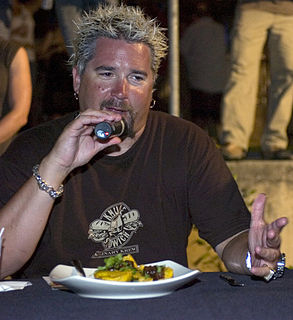A Quote by Alice Waters
In terms of kids not liking the food, I am shocked. I know that it's not true. I know that when kids are not educated about healthy food, they have a resistance to it. The resistance comes, again, from the fast-food culture.
Related Quotes
I think Americas food culture is embedded in fast-food culture. And the real question that we have is: How are we going to teach slow-food values in a fast-food world? Of course, its very, very difficult to do, especially when children have grown up eating fast food and the values that go with that.
I think America's food culture is embedded in fast-food culture. And the real question that we have is: How are we going to teach slow-food values in a fast-food world? Of course, it's very, very difficult to do, especially when children have grown up eating fast food and the values that go with that.
Fast food may appear to be cheap food and, in the literal sense it often is, but that is because huge social and environmental costs are being excluded from the calculations. Any analysis of the real cost would have to look at such things as the rise in food-borne illnesses, the advent of new pathogens, antibiotic resistance from the overuse of drugs in animal feed, extensive water pollution from intensive agricultural systems and many other factors. These costs are not reflected in the price of fast food.
One of the problems is that the US government supports unhealthy food and does very little to support healthy food. I mean, we subsidize high fructose corn syrup. We subsidize hydrogenated corn oil. We do not subsidize organic food. We subsidize four crops that are the building blocks of fast food. And you also have to work on access. We have food deserts in our cities. We know that the distance you live from a supplier of fresh produce is one of the best predictors of your health.
I talk about the food issue, I'm really coming at it from pre-White House times, when I was a working mother with a busy husband, a very demanding job and two little kids to feed.... I had to learn what it means to feed and care for your kids in a country where fast food is abundant, where time is a rarity, where eating out is a trend, because families are so busy.... Yes, I'm First Lady, but I know the struggles.
Those of us who think about what we eat, how it's grown, those of us who care about the environmental impact of food - we've been educated by fabulous books, like Fast Food Nation and documentaries like Food Inc. But despite these and other great projects that shine a critical light on the topic, every year the food industry spends literally tens of millions of dollars to shape the public conversation about our food system.
Approximately 82% of the American people believe labeling should take place with regard to genetically engineered ingredients. All over this country people are increasingly concerned about the quality of the food they are ingesting and the food they are giving to their kids. People want to know what is in their food, and I believe that is a very reasonable request.




































